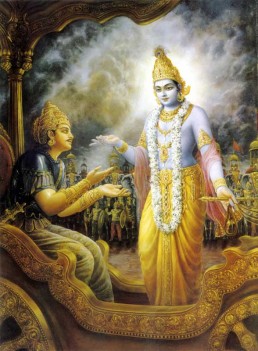Commentary
The cause of all sins and wrong actions in this world is desire. Anger is also a desire expressed in another form. When a man’s desire is not gratified he becomes angry with those who stand as obstacles in the way of their fulfillment. When a desire arises the quality of Rajas in a man urges him to work for its satisfaction.
The desire-anger-emotion combination of three-in-one is the root cause which makes an individual to compromise with higher values of existence. Once the virus of desire enters the intellectual computer the results are bound to be chaotic, blocking out the entire wisdom because desire is never satiated by its gratification. One gets rid of desire only through the constant practice of detachment. Therefore Sri Krishna says desire is the man’s greatest enemy on the earth because man commits sin only at the command of desire against his will and better judgment which lands him in terrible suffering in the form of repeated birth and death.
HOW DOES DESIRE AFFECT MAN?
Swami Chinmayananda
Swami Chinmayananda Commentary
The commentary on this verse and the rest, is avaialble for free as:
Kindle eBook
Google Play Book
Apple Books
Adi Sankara Commentary
Esah, this; kamah, desire, is the enemy of the whole world, because of which the creatures incur all evil. This desire when obstructed in any way turns into anger. Therefore, krodhah, anger, is also identical with this (desire). It is rajoguna-samudbhavah, born of the quality of rajas; or, it is the origin of the quality of rajas. For, when desire comes into being, it instigates a person by arousing rajas. People who are engaged in service etc., which are effects of rajas, and who are stricken with sorrow are heard to lament, ‘I have been led to act by desire indeed!’ It is mahaasanah, a great devourer, whose food is enormous. And hence, indeed, it is maha-papma, a great sinner. For a being commits sin when goaded by desire. Therefore, viddhi, know; enam, this desire; to be vairinam, the enemy; iha, here in this world.
With the help of examples the Lord explains how it is an enemy:
The Bhagavad Gita with the commentary of Sri Sankaracharya – Translated by Alladi Mahadeva Sastry
Holy Geeta – Commentary by Swami Chinmayananda
The Bhagavad Gita by Eknath Easwaran – Best selling translation of the Bhagavad Gita
The Bhagavad Gita – Translation and Commentary by Swami Sivananda
Bhagavad Gita – Translation and Commentary by Bhaktivedanta Swami Prabupadha
Srimad Bhagavad Gita Chapter 3 – Verse 37 – 3.37 kama esha krodha esha – All Bhagavad Gita (Geeta) Verses in Sanskrit, English, Transliteration, Word Meaning, Translation, Audio, Shankara Bhashya, Adi Sankaracharya Commentary and Links to Videos by Swami Chinmayananda and others – 3-37

